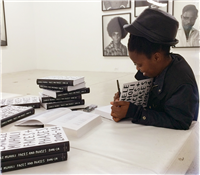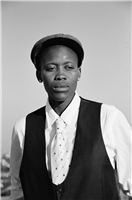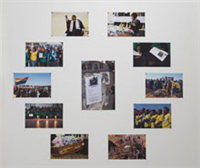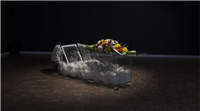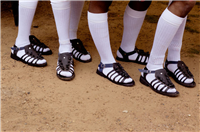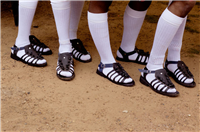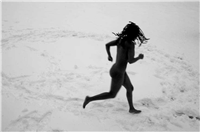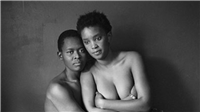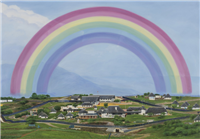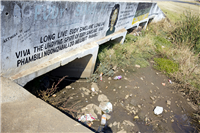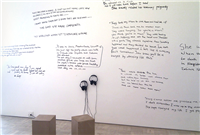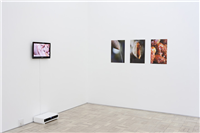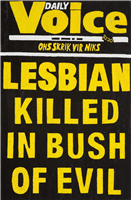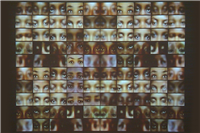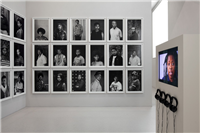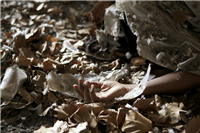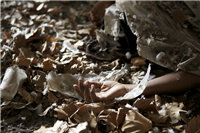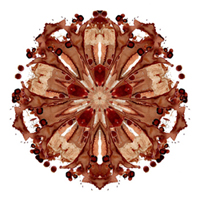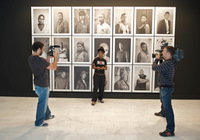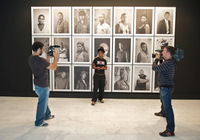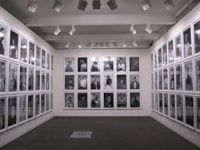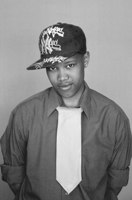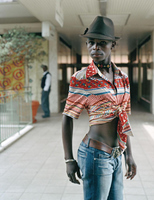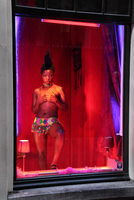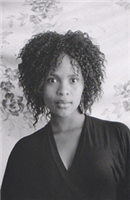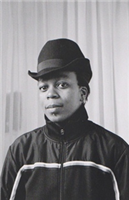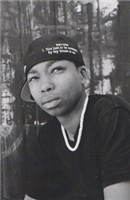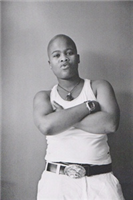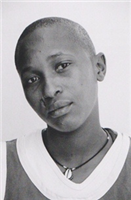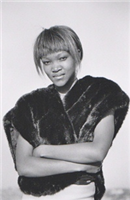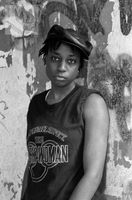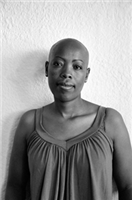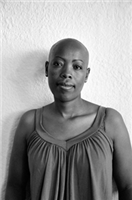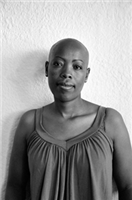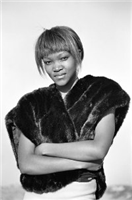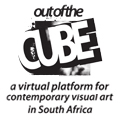Current Review(s)
'Life Less Ordinary' at Djanogly Gallery, Nottingham
Athi-Patra Ruga, Berni Searle, Pieter Hugo, Zanele Muholi and Nandipha Mntambo at Djanogly Art GalleryWhile thematic constructs such as ‘identity’ and ‘performance’ are familiar paradigms within the South African art circuit, often even fatigued, the rise of racialised nationalism in the UK and Europe (witness the 'immigration' policies of the British National Party and Italy's Lega Nord) gives the Djanogly Art Gallery’s latest exhibition, 'A Life Less Ordinary', a politically incisive edge.
Curator Anna Douglas takes her conceptual cue from a seminal essay by Ash Amin on today’s charged politics of difference. Aptly titled 'The Racialisation of Everything', Amin’s essay explores how racial categorisation is founded on ‘fictions of difference made to count as the irreconcilables of essence, sometimes justified on grounds of biological difference, sometimes on grounds of so-called cultural incompatibility’. With its focus on contemporary South African art, the exhibition explores personal fictions set in dialogue with some of identity’s grandest narratives. The resultant conversations are at turns satirical and subversive, interrogative and whimsical.
05 September 2009 - 15 November 2009
The Constitution of Love and Loss
Zanele Muholi at STEVENSON in JohannesburgIn March, Constitutional Court Judge Edwin Cameron visited the school where I teach, as part of a programme to mark Human Rights Month. Cameron said, in plain language at the front of a school hall, without the aid of a microphone, ‘I am a gay man.’ Despite our country’s proudly inclusive constitution, which has been in place for around twenty years, and despite the wide protection that previously-marginalized groups enjoy under law, that such a simple statement of self-definition can be so electrifying clearly illustrates for me the gulf between legal and social standards.
Zanele Muholi’s latest show at Stevenson Gallery in Johannesburg, ‘Of Love & Loss’, resonated with this experience. Muholi calls herself a visual activist as well as an artist, and she has the battle scars to prove that her order of activism remains vital. A widely-reported incident in 2010 by then-Minister of Arts and Culture Lulama Xingwana at a Constitution Hill exhibition saw Xingwana walking out of the show she was supposed to open. The show included some of Muholi’s more tender images of black same-sex couples embracing. Xingwana later said through a spokesperson that she felt the work on show was ‘immoral, offensive, and going against nation-building.’ The South African Constitution, which in section 9 expressly prohibits government and private parties from discriminating on the basis of sexual orientation, was ironically absent from Xingwana’s pronouncements on Constitution Hill.
14 February 2014 - 04 April 2014
Mo(u)rning
Zanele Muholi at STEVENSON in Cape Town
‘human beings are human insofar as they bear witness to the inhuman’
Giorgio Agamben – Remnants of Auschwitz
It's not often that an exhibition has brought me to tears. In all likelihood there aren't many I would expect to. It's not that we don't imagine ourselves saddened or moved when viewing what we consider to be contemporary art, but in those instances where a sufficient level of pathos exists, our capacity to comprehend the dynamics at play usually stops short of such an emotional rise. Crying in an exhibition is also a little embarrassing, so it was with some surprise that I found myself quietly wiping the tears from my eyes half way through visiting Muholi's recent exhibition.
'Mo(u)rning' is an expansive and deeply affecting body of work that extends Muholi's documentation of the lives of the black LGBTI (lesbian, gay, bisexual, transexual and intersex) community. Working predominantly through portraiture, Muholi has sought to produce a history that pays homage to the diversity of identities that fall within its ambit. In particular she has focussed on the lives of black lesbian women, whose repeated violent victimisation in South Africa amplifies our awareness of the degradation that many women across the spectrum experience on a daily basis. It's also particularly poignant that Muholi's work was shown during the tragic farce that is Women's Month in this country: a month in which Rape Crisis in Cape Town (a city with some of the highest rape figures in the world) almost shut its doors due to lack of funding.
26 July 2012 - 01 September 2012
Faces and Phases
Zanele Muholi at FRED London LtdIn August 2009, at the opening of the 'Innovative Women' exhibition in Johannesburg (which showcased photographs by Zanele Muholi as well as nine other black South African female artists), the Minister of Arts and Culture Lulama ‘Lulu’ Xingwana walked out before giving her proposed opening speech. The minister found certain images on the show offensive in their display of ‘naked bodies presumably involved in sexual acts’ (Xingwana, as quoted in Mail & Guardian March 04, 2010). According to reports at the time in the Mail & Guardian, the minister was particularly offended by Muholi’s images of black women affectionately holding each other in bed, deeming the images sexually explicit.
Considering the ubiquity of naked bodies in the media, and the similarly frequent suggestion of heterosexual sex, Muholi and many others saw the minister’s actions and subsequent statements as blatantly homophobic and potentially causing the perpetuation of hate crimes against black lesbians in South Africa. In the ensuing debate, various opinions surfaced which raise questions about art in post-apartheid South Africa: Do artists have a responsibility to fulfill a program of ‘nation building’, as the minister suggested? If so, what exactly is the collective vision for such a nation? And how does a delineation - if one is indeed needed - between art and pornography, fit into this vision?
These questions remain interesting in revealing the very particular climate of the art scene in South Africa, in contrast to the state of affairs in many Western countries where images and performances of a far more explicit nature are so pervasive as to be almost banal. In light of the apparent specificity of the South African scene; a country that accepts homosexuality in its democratic constitution while (as Muholi points out) many homosexual people are constantly subjected to violent hate crimes, one wonders about the significance of the location of Muholi’s current exhibition, 'Faces and Phases', in London. An English audience will inevitably read these portraits differently, and it is possible that the bravery evident in the sitters’ consent to being represented is somewhat diminished. While resisting the tendency to generalize, one must acknowledge the difference between being ‘queer’ in London and being ‘queer’ in Soweto. Muholi’s portraits emphasize the importance of the continuing struggle for the acceptance of sexual orientation and the need to acknowledge the vast differences in its acceptance in different contexts.
24 June 2010 - 04 August 2010
Listings(s)
Faces and Phases
Zanele Muholi at FRED London LtdThis solo by Zanele Muholi titled ‘Faces and Phases’, shows a selection of photographs from Muholi”s ongoing series by the same name. The black and white portraits focus on the commemoration and celebration of black lesbians' lives, and challenges societal ideas around gender and sexuality.
24 June 2010 - 04 August 2010
'Life Less Ordinary' at Djanogly Gallery, Nottingham
Athi-Patra Ruga, Berni Searle, Pieter Hugo, Zanele Muholi and Nandipha Mntambo at Djanogly Art Gallery'Life Less Ordinary' considers fictions of categorization and difference - be it the idea of race, nationhood, ethnicity, sexuality, religion or belonging -explored by a range of contemporary artists from South Africa.
This exhibition brings together works of photography, performance, film and installation by a younger generation wishing to shake loose from the epic narrative of race to play with, stage, transcend, celebrate and deconstruct more complex and nuanced subjectivities.
Artists include Pieter Hugo, Zanele Muholi, Nandipha Mntambo, Steven Cohen, Dineo Bopape, Berni Searle and Andrew Putter.
05 September 2009 - 15 November 2009
Rencontres de Bamako Biennial of African photography
Jodi Bieber, Graeme Williams, Riason Naidoo, Zanele Muholi, Dinkies Sithole, Alastair Whitton and Lebohang Mashiloane at Rencontres de Bamako: Biennial of African photographyThe theme of this year’s Bamako Biennial for photography and video art is ‘Borders.’
From natural barriers to artificial lines traced across the earth, in Africa more than elsewhere, borders and their complex realities represent current problematics and the crystallizations of processes which are political, economic, sociocultural, and at this time particularly tied up with ethnic, cultural, religious and other sorts of personal and group identifications.
South African artists showing are Riason Naidoo, Dinkies Sithole, Jodi Bieber, Zanele Muholi, Lebohang Mashiloane, Graeme Williams and Alastair Whitton
07 November 2009 - 07 December 2009
Short Change
Tracey Edser, Zanele Muholi, Khabazela Mkhize and Nontsikelelo Veleko at Market Photo WorkshopTo celebrate the 20th anniversary of the Market Photo Workop, this exhibition of photographic works by recent graduates from the Workshop looks the extent to which change in South Africa since 1994 is visible.
14 October 2009 - 07 November 2009
'...for those who live in it, Pop-culture politics and strong voices'
Athi-Patra Ruga, Zanele Muholi, Faith47, Gugulective and Musa Nxumalo at MU'...for those who live in it, Pop-culture politics and strong voices' is the title of a project that will bring new works of ten South African artists to the Netherlands.
The generation of young artists now emerging in South-Africa is the first to grow up and start its own art practice after apartheid. These artists are very aware of this, and are emphatically searching for their own way to express the political and social implications of this in their work. This could, on the one hand, be by making bold political statements, or on the other, by ignoring politics altogether.
Due to the Soccer World Cup, which will be held in South Africa around the same time, major brands such as Nike, Coca Cola and Sony have become an integral part of the South-African street scene. '...for those who live in it' aims to provide an alternative, contrasting perspective, by showing us a broad palette of unorthodox, activist, dynamic expressions at the interface of contemporary art and pop culture, particularly in Cape Town and Johannesburg.
Artists on show are Athi-Patra Ruga, Gugulective, Spoek Mathambo, Kudzanai 'Kudzi' Chiurai, Musa Nxumalo, Zanele Muholi, Bitterkomix, Faith47, Love and hate, Chimurenga.
22 May 2010 - 30 June 2010
Life Less Ordinary: Performance and Display in South African Art'
Athi-Patra Ruga, Berni Searle, Brett Bailey, Zanele Muholi, Araminta de Clermont and Nandipha Mntambo at FfotogalleryFfotogallery, the national development agency for photography and lens-based media in Wales, presents ‘Life Less Ordinary’; a major exhibition held at two sites, featuring timely work by a selection of artists working and living in South Africa today.
'Life Less Ordinary' brings together photography, performance, video and installation work by a young generation of South African artists wishing to break away from epic narratives of race and instead play with, celebrate, stage and transcend more complex notions of difference and identity.
The exhibition features a range of work by artists Tracey Rose, Nandipha Mntambo, Zanele Muholi, Brett Murray, Pieter Hugo, Dineo Bopape, Brett Bailey, Athi-Patra Ruga, Steven Cohen, Araminta de Clermont and Berni Searle, including work selected for Artes Mundi 1 and acquired by the Museum of Wales for the national collection.
‘Life Less Ordinary’ has been curated by Anna Douglas and is a touring exhibition from the Djanogly Art Gallery, Lakeside Arts Centre at the University of Nottingham.
07 May 2010 - 19 June 2010
'Faces and Phases'
Zanele Muholi at FRED London LtdAs Zanele Muholi articulates, the photographic portrait series of 'Faces and Phases' is:
'...an insider's perspective that both commemorates and celebrates the lives of the black queers I have met in my journeys. Some of their stories gave me sleepless nights as I tried to process the struggles that were told to me. Many of the women I met had been violated and I endeavoured not to exploit them further through my work. I set out to establish relationships with them based on a mutual understanding of what it means to be female, lesbian and black today. "Faces and Phases" is about our histories and the struggles that we continue to face.'
24 June 2010 - 01 August 2010
'Events of the Self: Portraiture and Social Identity'
Jo Ractliffe, Guy Tillim, Kay Hassan, Berni Searle, David Goldblatt, Santu Mofokeng, Hentie van der Merwe, Pieter Hugo, Zanele Muholi, Candice Breitz, Zwelethu Mthethwa and Nontsikelelo Veleko at The Walther CollectionThe Walther Collection opens to the public on June 17, 2010 with 'Events of the Self: Portraiture and Social Identity', introducing works from its African collection. Under the curatorial direction of Okwui Enwezor, the exhibition comprises a series of four projects filling all nine galleries in the three buildings of the new exhibition space in Burlafingen near Ulm, Southern Germany. The exhibition integrates the work of three generations of African artists and photographers with that of modern and contemporary German photography. This combination of African and German works will serve as a model for the kind of curatorial process that animates the character of the collecting program.
Works in the collection include those by Berni Searle, Candice Brietz, Nontsikelelo Veleko, Zanele Muholi, Hentie van der Merwe, David Goldblatt, Kay Hassan, Pieter Hugo, Guy Tillim, Zwelethu Mthethwa, Santu Mofokeng and Jo Ractliffe.
17 June 2010 - 17 October 2010
Bopape Dumas Muholi
Dineo Bopape, Zanele Muholi and Marlene Dumas at MMKA, ArnhemThis winter, the MMKA combines installations, photographs and videos by the South African artists Dineo Bopape (1981) and Zanele Muholi (1972) with a presentation of work from the year 1980 by Marlene Dumas (1953). The exhibition traces the formal and thematic relationships that emerge, including the use of found material, the sensual pleasure in the processes of collage, the display of the body, and the portrait as a metaphor. Their means of imagining is embedded in sharp critical reflection, making clear that despite the generation gap, this is a strong common source from which all three artists draw.
18 December 2010 - 13 March 2011
'Africa: See You, See Me'
Zanele Muholi and Various Artists at Fondazione Studio MarangoniPresented in collaboration with New York University La Pietra Policy Dialogues and NYU Africana Studies, 'Africa: See You, See Me' - curated by Awan Amjpa - hosts 36 artists' work. It focuses on African postcolonial photography and its global influence on visual language in the representation of Africa and its Diaspora.
18 February 2011 - 22 April 2011
'20 Years: Thami Mnyele Foundation'
Dineo Seshee Bopape, Zanele Muholi, Mustafa Maluka, Senzeni Marasela and Various Artists at Thami Mnyele FoundationTwenty years ago, inspired by the South African artist and freedom fighter Thami Mnyele (1948-1985), a group of Amsterdam-based artists and concerned citizens set up an artists-in-residence programme, enabling artists from Africa the opportunity to live and work in Amsterdam for a period of three months. The atelier that the Thami Mnyele Foundation made available continues to be a vibrant meeting place for artists from Africa and the Netherlands.
The Thami Mnyele Foundation together with the CBK has selected the work of 26 artists out of the 68 artists that have been working in the studio over the last twenty years. This choice gives a glimpse into the diversity of contemporary art practices coming out of Africa. The exhibited works were made by the artists and donated to the Thami Mnyele Foundation during their stay in Amsterdam.
South African artists feature particularly strongly on the exhibition, which includes: Dineo Seshee Bopape, Clifford Charles, Ruan Hoffmann, Senzeni Marasela, Mustafa Maluka, Zaneli Muholi, John Murray, Progress Matubako, Sheppard Mtyshelwa, Ndikhumbule Ngqinambi, Thulani Songwe, Adriaan de Villiers, Tito Zungu and Ina van Zyl.
12 March 2011 - 29 April 2011
'Reflections on the Self: Five African Women Photographers'
Zanele Muholi and Nontsikelelo Veleko at Southbank Centre'Reflections on the Self' features five contemporary African women photographers whose work deals with women's narratives through self-portraits or portraits of others. The artists are Hélène Amouzou (Togo, Belgium), Majida Khattari (Morocco, France), Zanele Muholi (South Africa), Senayt Samuel (Eritrea, UK), and Nontsikelelo Veleko (South Africa). The exhibition, curated by Christine Eyene, focuses on female photographic practice in Africa and the diaspora, and examines the gaze of women photographers and how this is informed by the politics of representation. The title refers literally to the mirror image and also to photography as a means of thinking about the self, as both subject and object.
Organised by the Hayward Gallery to correspond with the 100th International Women's Day (08 March 2011), this exhibition will be shown in the Royal Festival Hall (Spirit Level) of the Southbank Centre.
08 March 2011 - 03 April 2011
'Faces and Phases'
Zanele Muholi at STEVENSON in JohannesburgZanele Muholi shows 66 new portraits in this ongoing series which offers an insider's perspective on the lives of the black lesbians and transmen she has met on her journeys as an activist. Collectively, the portraits are at once a visual statement and an archive: marking, mapping and preserving an often invisible community for posterity.
Muholi writes: 'In the face of all the challenges our community encounters daily, I embarked on a journey of visual activism to ensure that there is black queer visibility. "Faces and Phases" is about our histories and the struggles that we face. "Faces" express the person, and "Phases" signify the transition from one stage of sexuality or gender expression and experience to another.'
07 July 2011 - 05 August 2011
'Appropriated Landscapes'
Jo Ractliffe, Guy Tillim, Jane Alexander, David Goldblatt, Penny Siopis, Santu Mofokeng, Angela Ferreira, Sabelo Mlangeni, Zanele Muholi and Mikhael Subotzky and Patrick Waterhouse at The Walther Collection'Appropriated Landscapes' explores landscape typologies in South Africa, Namibia, Angola, and Mozambique, and presents works by fourteen artists, including Jane Alexander, Ângela Ferreira, David Goldblatt, Sabelo Mlangeni, Santu Mofokeng, Zanele Muholi, Jo Ractliffe, Penny Siopis, Mikhael Subotzky/Patrick Waterhouse and Guy Tillim.
Many of the artists presented in 'Appropriated Landscapes' have created images through topographical studies, explorations of nomadic peripheries and in-between spaces, or chronicles of social geography altered by divisive spatial planning and modern architecture. The concept of landscape here is not linked to historical notions of the picturesque and the sublime. Instead, the exhibition considers landscape as a prism of experience, a reflection of ideology, and a stage for the performance and perception of identity. Whether sweeping views, architectural compositions, or portraits, the varied works in the exhibition remind us of the density and richness of the notion of landscape, the complexity and subjectivity of its depiction - and ultimately, of our own spiritual, emotional, personal, and political relationship to it.
16 June 2011 - 13 May 2012
'Face of our Time'
Zanele Muholi at San Francisco Museum of Modern Art (SFMoMA)'Face of our Time' presents the work of five photographers - Jim Goldberg, Daniel Schwartz, Zanele Muholi, Jacob Aue Sobol and Richard Misrach - who share an interest in making pictures that capture what the world looks like. They observe the sometimes-volatile civil and political transformations facing society, recording history as it unfolds over time. Goldberg gives voice to the experiences of refugees in socially and economically devastated African countries. Schwartz studies the effects of globalization across central Asia's ancient Silk Route. Muholi provides a visual identity for the queer black population so often marginalized in her native South Africa. Aue Sobol combines observations of the rural hunting culture in a remote Arctic village with intimate portraits of his girlfriend, Sabine. And Misrach photographs the graffiti left behind in New Orleans after Hurricane Katrina.
02 July 2011 - 16 October 2011
'Isilumo siyaluma (2006-2011)'
Zanele Muholi at blank projects"Isilumo siyaluma is a Zulu expression that can be loosely translated as “period pains/ periods pain". Additionally, there is an added meaning in the translation that there is something secretive in and about this blood/“period in time". At one level, my project deals with my own menstrual blood, with that secretive, feminine time of the month that has been reduced within Western patriarchal culture as dirty. On a deeper level then, my menstrual blood is used as a vehicle and medium to begin to express and bridge the pain and loss I feel as I hear and become witness to the pain of 'curative rapes' that many of the girls and women in my black lesbian community bleed from their vaginas and their minds.? ?Between March - May 2011, three (3) young black lesbians under the age of 25 were brutally murdered in various townships. Nokuthula Radebe (20), Katlehong, whose body was discovered on Monday 28th March late afternoon around 5pm by kids playing in an abandoned building in Everest Thokoza, Ekurhuleni. According to FEW website, her friend Simangele who saw the body before it was taken by police say that Nokuthula’s pants were pulled down, but was still wearing her underwear. Her faced was covered by a plastic and had been strangled with one of her shoelaces.? ?Noxolo Nogwaza (24), Tsakane, Johannesburg. Her body was found lying in an alley in Kwa-Thema at about 9am on Sunday, April 24 2011. Her head was completely deformed, her eyes out of the sockets, her brain spilt, teeth scattered all around and face crashed beyond recognition. Witnesses say that an empty beer bottle and a used condom were stacked up her genitals. Parts of the rest of her body had been stabbed with glass. A large pavement brick that is believed to have been used to crash her head was found by her side.??Nqobile Khumalo (23), KwaMashu F-section, Durban, went missing on May 4 and her body was found in a shallow grave near her parents’ home two days later.??As we continue to live and survive in troubled times as black lesbians in South Africa and within the continent, where rampant hate crimes and brutal killings of same gender loving women is rife. This ongoing project is an activist/artist's radical response to that violence.??Each patterned piece in this series represents a 'curative rape' survivor or a victim of hate crime, the physical and spiritual blood that is shed from our bodies.? ?-Zanele Muholi
On Friday the 4th of November 2011, as part of the exhibition, Muholi will be in dialogue with twelve women in which each participant will relate her own relationship with blood/menstruation and the functions of female bodied beings. The talk will also revolve around the fears of being raped or having survived sexual assault or how people respond to such violent incidents when hearing or reading about them in media.
03 November 2011 - 26 November 2011
dOCUMENTA (13)
Zanele Muholi, William Kentridge and Kudzanai Chiurai at Various venues around KasseldOCUMENTA (13) is conceived as a series of artistic acts and gestures that are already taking place, as well as the main exhibition in Kassel. According to Artistic Director Carolyn Christov-Bakargiev, dOCUMENTA (13) does not follow a single, overall concept but engages in conducting, and choreographing manifold materials, methods, and knowledges. Questions of personal and collective emancipation through art emerge in the process of making dOCUMENTA (13) by thinking through a number of composite ontologies that generate paradoxical conditions of contemporary life and artistic production. Exploring this set of composite ontologies and considerations, the exhibition will be held in various locations and places, and will include new works by more than 100 artists from around the world. In some cases, these will be presented as parts of projects with other artists, agents, or persons active in cultural fields including science and literature. Furthermore, a number of historical artworks will be exhibited in these interrelated ideas, conversations, and parallel stories.
09 June 2012 - 16 September 2012
'Next Generation'
John Murray, Ruan Hoffmann, Dineo Seshee Bopape, Hasan and Husain Essop, Santu Mofokeng, Jeremy Wafer, Zanele Muholi, Clifford Charles, Nicholas Hlobo and Ndikhumbule Ngqinambi at Pilchri StudioIn 1993 the Thami Mnyele Foundation initiated the exhibition 'Zuider Kruis/ Southern Cross' in Stedelijk Museum Amsterdam, an exhibition of contemporary art from South Africa with artists who had been taking part in the Venice Biennial the previous year. Now 19 years later, the Thami Mnyele Foundation exhibits the work of a new generation of artists from South Africa in cooperation with the Pulchri Studio in The Hague. 'Next Generation' presents a selection of 20 contemporary artists from South Africa who have been working in the Thami Mnyele Foundation as 'Artist-in-Residence' during the past years.
Artists include: Hasan and Husain Essop, Michele Tabor, Ina van Zyl, Sandra Kriel, Ndikhumbule Ngqinambi, Adriaan de Villiers, Ruan Hoffmann, Zanele Muholi, Dineo Bopape, Clifford Charles, Thulani Shongwe, Nicolas Hlobo, John Murray, Senzeni Maracela, Jeremy Wafer, Shepard Mtyshelwa, Progress Matubako, Pat Mautloa and the work of the current resident Nisren Abasher, a Sudanese artist. It also encompasses the work of the Artist-in-Residence for June to July 2012: Santu Mofokeng.
02 June 2012 - 22 July 2012
MO(U)RNING
Zanele Muholi at STEVENSON in Cape TownStevenson presents 'MO(U)RNING', a solo exhibition by visual activist and photographer Zanele Muholi.
For Muholi, 'MO(U)RNING' evokes death but also suggests the cycle of life as morning follows night. Life and death, love and hate are some of the antitheses that appear throughout her work.
In April this year, Muholi's Cape Town apartment was burgled in what was apparently an attack directed at her visual activism. The lost material was an extensive archive of photographic work, videos and texts documenting hate crimes in South Africa and gender issues in Africa. Among this material was the Queercide project, created by Muholi to denounce and record hate crimes and atrocities committed against lesbian, gay, bisexual, transgender and intersex (LGBTI) people.The loss of this material raised many questions for Muholi. What happen when such images disappear or when a collection of testimonies is erased?
In 'MO(U)RNING', Muholi presents elements of her documentation that were not lost, together with new work realised in recent months. The exhibition will include new and recent photographs from her Faces and Phases series of portraits and her Being series. Her multiple award-winning documentary Difficult Love, currently on view at Documenta 13 together with Faces and Phases, will be screened for the first time at the gallery. Photographs of crime scenes and new video works will also form part of the exhibition.
Her work gives public life to a community, its joys, traumas, fights and daily existence. She uses the power of visual material, offered by photographs and film, to affirm existing realities and expose truths and the cruel aspects of 21st century South African society where loving can be dangerous.
26 July 2012 - 01 September 2012
'Distance and Desire: Encounters with the African Archive'
Santu Mofokeng, Andrew Putter, Pieter Hugo, Sabelo Mlangeni, Zanele Muholi, Candice Breitz and Zwelethu Mthethwa at The Walther Collection Project SpaceDistance and Desire: Encounters with the African Archive
A three-part exhibition series on photography from Southern Africa, Distance and Desire: Encounters with the African Archive presents rarely before seen portraits, albums, cartes de visite, and books from the late nineteenth and early twentieth century. The exhibitions stage a dialogue between ethnographic visions and contemporary engagements with archival imagery and feature recent work African and African American artists. Distance and Desire offers new perspectives on the archive, reimagining its poetic and political dimensions, its diverse histories, and its changing meanings. The series is curated by Tamar Garb.
Exhibitions
The Walther Collection Project Space, New York Part I: Santu Mofokeng and A.M. Duggan-Cronin September 13 - November 17, 2012
The opening exhibition juxtaposes A.M. Duggan-Cronin's 'The Bantu Tribes of South Africa' with Santu Mofokeng's 'The Black Photo Album / Look at Me: 1890-1950.' Duggan-Cronin's eleven-volume study, published between 1928-1954, is renowned and contested for preserving an ethnographic vision of African heritage. In contrast, 'The Black Photo Album,' created in 1997 by contemporary South African artist Santu Mofokeng, is an archive of pictures - commissioned by black South Africans in the early twentieth century - and stories about the subjects, challenging fixed ideas of the "native type" most often associated with photographic representations of Africans.
Gallery Talks:
Jennifer Bajorek on Santu Mofokeng September 25, 2012 at 7pm
Jennifer Bajorek is a lecturer in the Department of Photography and Imaging at New York University.??John Peffer on Portraiture in South Africa ?October 23, 2012 at 7pm ?John Peffer is Associate Professor of Contemporary and Nonwestern Art History at Ramapo College.
Part II: Contemporary Reconfigurations
November 30, 2012 - March 9, 2013
This exhibition centers on photography and video art by contemporary African and African American artists who engage critically with the ethnographic archive by parodying, replaying, exposing, and dialoguing with its pictorial tropes and traditions. A stereotype or ethnographic vision in one era may provide material for an irreverent reworking, satirical performance, or elegiac reenactment in another. Addressing how the archive - broadly understood as an accumulation of representations, images and objects - figures in the practices of contemporary artists in Africa, the exhibition features recent work by Sammy Baloji, Candice Breitz, Samuel Fosso, Pieter Hugo, Zanele Muholi, Sabelo Mlangeni, Zwelethu Mthethwa, Andrew Putter, and Carrie Mae Weems.
Gallery Talk:
Awam Amkpa on Contemporary African Photography February 12, 2013 at 7pm
Awam Amkpa is Associate Professor in the Department of Social and Cultural Analysis at New York University.
Part III: Poetics and Politics March
22 - May 18, 2013
A presentation of vintage portraits, books, albums, postcards, and cartes de visite, this exhibition reveals the complexity of the African archive, showing works produced in the 1870s to the early twentieth century. Focusing on the pictorial languages deployed by photographers and the contexts in which images are made to circulate, both historically and today, these portraits and figure studies depict Africans predominantly through the filters of European cameras and mentalities. The images make visible both the ideological frameworks that prevailed during the colonial period in South Africa as well as the extraordinary skill of photographers working in the studio and the landscape.
Gallery Talks:
Tamar Garb on 'Distance and Desire' March 23, 2013 at 3pm
Tamar Garb is the Durning Lawrence Professor in the History of Art at University College London.
Hlonipha Mokoena and Cheryl Finley in conversation on The South African Photo Album April 9, 2013 at 7pm
Hlonipha Mokoena is Assistant Professor of Anthropology at Columbia University. Cheryl Finley is Associate Professor of Art and Visual Studies at Cornell University.
Symposium Encounters with the African Archive
November 10, 2012, 10am - 5pm
New York University, Silver Center, 100 Washington Square East
Coinciding with the exhibition series, The Walther Collection, in collaboration with New York University and University College London, will present a symposium to explore issues raised by the collection's archive of African photography. This one-day event brings together leading international scholars to exchange, debate and open up the categories often used to describe historic photographs of Africans: colonial, ethnographic, anthropological, artistic. The symposium will provide a space for rethinking the African archive in relation to the concerns of contemporary critics and artists. Participants include Elizabeth Edwards (Durham University), Tamar Garb (University College London), Christraud Geary (Museum of Fine Arts, Boston), Michael Godby (University of Cape Town), Erin Haney (George Washington University), Salah Hassan (Cornell University), Hlonipha Mokoena (Columbia University), Riason Naidoo (South African National Gallery), Gabi Ncobo (University of the Witswatersrand), Chika Okeke-Agulu (Princeton University), John Peffer (Ramapo College), and Deborah Willis (New York University).
Free and open to the public. To register, email invitation@walthercollection.com.
Catalogue
The exhibition program will be accompanied by the publication of a major scholarly catalogue, 'Distance and Desire: Encounters with the African Archive', edited by Tamar Garb and Artur Walther. Released in March 2013 to coincide with the opening of "Poetics and Politics," the catalogue, co-published with Steidl, will include all exhibited visual material as well as new research generated by the symposium's debate and discussion.
Exhibition
The Walther Collection, Neu-Ulm, Germany
Distance and Desire: Encounters with the African Archive June 8, 2013 - May 18, 2014
The culmination of the exhibition series will be an expanded presentation of Parts I, II, and III of 'Distance and Desire' at The Walther Collection's museum campus in Neu-Ulm, Germany. For the first time the exhibition will be shown in its entirety, complete with additional contemporary works that will broaden the dialogues and juxtapositions staged in New York.
13 September 2012 - 17 May 2015
'The Progress of Love'
Zanele Muholi, Kendell Geers and Zwelethu Mthethwa at The Menil CollectionNumerous scholars have addressed the ways media, technology, and capitalism have affected Western notions of love over the last few centuries. Little attention, however, has been paid to the impact of these forces on the conception of love in Africa, or even to the subject itself. 'The Progress of Love' explores romantic love, self-love, friendship, familial affect, love of one’s country, and other bonds in and around the continent. Though the exhibition is weighted towards art produced specifically about love in Africa, works that might otherwise be considered more “Western” in orientation are included as well, calling attention to the global exchange through which such concepts develop, and to both the shared and distinct aspects of the experience of love.
Bringing together the work of over twenty artists, and ranging in media from painting and photography to installation, video, and performance, 'The Progress of Love' considers how technology, economic systems, and other forces have shaped–and continue to shape–ideas about love and their expression. In doing so, the exhibition seeks to ask what part of love is universal? What part is timeless and what is a cultural construct?
Yinka Shonibare’s The Swing, 2001, calls attention to the way Western notions of romantic heterosexual, monogamous love were brought into being through an increasingly globalized economy and reproductive technologies such as the printing press. Mounir Fatmi’s Connections (Conspiracy), 2008, an installation of seminal Western and Arabic books wired together, speaks to the international circuits through which love travels, and of the transformative, sometimes even explosive, effects of the dissemination of religious and philosophical texts on ideas of the self and other. Artists such as Zoulikha Bouabdellah and Kendell Geers consider the effects of language, how one’s primary or secondary tongue affects the way one conceives of this dyad, and raise questions about the ability to be understood across a linguistic or cultural gap.
While many works in the show explicitly address the subject of love, others can be understood more indirectly as acts of love in their creation or in the experience they provide. Created specifically for this exhibition, in Romuald Hazoumé’s new project the artist has founded a nongovernmental organization based in Cotonou, Benin, and is inviting his fellow Beninois to express love for self and others by making contributions to Westerners in hopes of helping them live better lives. In so doing, he offers a critical reevaluation of charity and the intersections between love and money.
Accompanied by a fully illustrated catalogue and a rich program of related events, The Progress of Love examines the varied and ever-changing conceptions of love, pointing to the intercultural currents that inform them and in which they, in turn, inform. The project is co-organized by Kristina Van Dyke, former curator for collections and research at the Menil Collection, and Bisi Silva, director of the Centre for Contemporary Art in Lagos. 'The Progress of Love' exhibition will be mounted simultaneously at both venues and also at the Pulitzer Foundation for the Arts in St. Louis. A series of web-format exchanges further links the two incarnations.
'The Progress of Love' is a collaborative project between The Menil Collection, Houston, Centre for Contemporary Art, Lagos (CCA, Lagos), and the Pulitzer Foundation for the Arts, St. Louis.
02 December 2012 - 17 March 2013
'fo(u)nd'
Zanele Muholi at Prince Claus Fund GalleryZanele Muholi’s photographs are a direct response to the epidemic of ‘curative rapes’ and murders of black lesbians in South Africa today. As a self-described ‘visual activist’, Muholi seeks to challenge the status quo with intimate portraits of the queer South African experience. The exhibition 'fo(u)nd' features a selection of Muholi’s works from 'Faces and Phases', 'Beulahs' and 'Being' (2006-present), among others.
Muholi is the recipient of numerous awards, including: the Index on Censorship award for Freedom of Expression (2013), London; the LGBTI Recognition Award for the Best Photographer (2012), Johannesburg; the Casa Africa Award for Best Female Photographer (2009), Bamako; and the Fanny Ann Eddy Accolade from IRN-Africa (2009), New York. Muholi's photographs have been exhibited around the world, most significantly at the South African Pavilion at the 2013 Venice Biennale, Italy and in 2012 at dOCUMENTA (13) in Kassel, Germany. In 2009, Muholi founded the queer media collective Inkanyiso (http://inkanyiso.org/).
Muholi will participate in a conversation about her work with Board Member of the Prince Claus Fund and Human Rights Watch LGBT Rights Advocacy Director Boris Dittrch. Boris Dittrich is Board Member of the Prince Claus Fund and Advocacy Director for the LGBT Rights Programme at Human Rights Watch.
Zanele Muholi dedicates the exhibition fo(u)nd to the memory of Duduzile Zozo, a 26-year-old black lesbian who was raped and murdered. Her body was found at her neighbour's house in Thokoza township, Johannesburg in June 2013.
06 September 2013 - 22 November 2013
'Queer and Trans Art-iculations: Collaborative Art for Social Change'
Zanele Muholi and Gabrielle Le Roux at Wits Art MuseumWits Art Museum, in partnership with Wits Centre for Diversity Studies and Inkanyiso, is proud to announce the exhibition 'Queer and Trans Art-iculations: Collaborative Art for Social Change'. This important project features the work of two visual activists: Zanele Muholi '(Mo(u)rning)' and Gabrielle Le Roux '(Proudly African & Transgenderand Proudly Trans in Turkey)'. The exhibition coincides with the official launch of the Wits Centre for Diversity Studies.
Homosexual and gender non-conforming people are discriminated against, victimised, penalized and criminalized. As insiders and concerned citizens within the LGBTI community who make art, Muholi and Le Roux employ art-activism as a resistance tool and a way to reveal how the LGBTI community exists within society. The works of both artists speak to the complexities, challenges, freedoms and dangers of living beyond the gender binary.
Recently, the Ugandan and Nigerian governments have enacted anti-homosexuality legislation which will put so many citizens in physical danger and deprive them of their freedom of expression and human rights. In Turkey there is a spiraling number of hate murders of Trans women in particular, for the majority of whom sex-work is the only available employment as a result of discrimination and social exclusion. South Africa is notorious for the rampant hate crimes that have claimed so many young lives especially black lesbians residing in the townships. These are some of the issues that the joint exhibition addresses. While 'Proudly African & Transgender' and 'Proudly Trans in Turkey', are created in collaboration with trans and intersex activists from southern and East Africa, and Turkey, 'Mo(u)rning' engages with the experiences of black lesbians and queer people particularly in South Africa.
For the duration of the exhibition, facilitators who can speak to the issues represented in the work from lived experience will be in attendance to assist with queries and provide impromptu guided tours of the work, free of charge. WAM has also created an interactive space for visitors to respond to the exhibition and share their experiences and thoughts.
Programming and special events:
Artist TALKABOUT with Gabrielle Le Roux, 8 February 12h00
Family TALKABOUT with Leigh Blanckenberg, 15 February 12h00
Artist TALKABOUT with Zanele Muholi, 22 February 12h00
Exhibition facilitators will be available Wed-Sun 10h00-16h00
Opening Night:
Keynote speech by Pregs Govender, Deputy Chair of the South African Human Rights Commission
Performance by Zanele Muholi on the opening night to begin at 19h00.
30 January 2014 - 30 March 2014
'Of Love & Loss'
Zanele Muholi at STEVENSON in JohannesburgSTEVENSON present 'Of Love & Loss', a solo exhibition by visual activist and photographer Zanele Muholi. The opening coincides with the presentation of a prestigious Prince Claus Award to Muholi in Johannesburg.
In times of increasingly homophobic legislation enacted by African countries and in a climate of intolerance towards homosexuals in the Western world, South Africa distinguishes itself with a Constitution that recognises same-sex marriages; yet the black LGBTI (lesbian, gay, bisexual, transgender and intersex) community is plagued by hate crimes. Black lesbians are particularly vulnerable and are regularly victims of brutal murders and 'curatives rapes' at the hand of neighbours or 'friends'.
In 2013 Muholi has been documenting weddings and funerals in the black LGBTI community in South Africa, joyful and painful events that often seem to go hand in hand. The show features photographs, video works and an installation highlighting how manifestations of sorrow and celebration bear similarities and are occasions to underline the need for a safe space to express individual identities.
As Muholi writes:
Ayanda Magoloza and Nhlanhla Moremi's wedding in Katlehong took place four months after Duduzile Zozo was murdered in Thokoza. Promise Meyer and Gift Sammone's wedding in Daveyton took place on 22 December in Daveyton, 15 days after Maleshwane Radebe was buried in Ratanda. Six months earlier, Ziningi and Delisile Ndlela were married in Chesterville, Durban. Many in the area attended the ceremony, blessed the newlywed couple and prayed for them and their children. We long for such blessings as we continue to read about the trials and tribulations that LGBTI persons experience in their churches, where homosexuality is persecuted. In 2014, when South African democracy celebrates its 20 years, it seems more important than ever to raise again our voice against hate crimes and discriminations made towards the LGBTI community.
The exhibition includes also a series of autobiographical images, intimate portraits of Muholi and her partner taken during their travels, a tender counterpoint to the tension still generated in South Africa today by same-sex and interracial relationships.
14 February 2014 - 04 April 2014
'Knokke-Heist Fotofestival 2014'
Jodi Bieber, Yinka Shonibare, Sabelo Mlangeni, Zanele Muholi and Nontsikelelo Veleko at Various locations in Knokke HeistThe Photo Festival’s main exhibition, 'Haute Africa', highlights the work of several leading international photographers in various locations in Knokke-Heist’s public space.
'Haute Africa' focuses on the work of photographers who are not interested in African fashion per se but who choose instead to conduct an anthropological study of contemporary African clothing culture. With their fine sense for the various developments in society, they reflect on the various social, political and economic issues that fashion expresses.
Several African countries, including Ivory Coast, Kenya, Nigeria, Tanzania and Zambia have a flourishing economy. South Africa’s economy is the largest in Africa, making it a major global player. These countries primarily owe their progress to the exploitation of the minerals in Africa’s rich soil, but creative and sustainable economies are also seeing growth.
The fashion industry is a good example of such a creative industry. Many African designers, entrepreneurs and photographers inspire the world with new designs that convey and renew African identity. Their creations find their way to the West, through the Internet, during international fashion weeks and thanks to several initiatives aimed at promoting fashion. Artists and photographers soon also noticed this development. They use clothing cultures to better understand the convictions, thoughts and feelings of the wearers or the history of a particular place. They examine such topics as Westernisation, post-Colonialism, race and gender equality, religious beliefs or political power.
The participating artists/photographers are Martin Parr, Wangechi Mutu, Viviane Sassen, Zanele Muholi, Jodi Bieber, Jim Naughten, Phyllis Galembo, Héctor Mediavilla, Sabelo Mlangeni, Jehad Nga, Hassan Hajjaj, Nontsikelelo Veleko, Baudouin Mouanda, Daniele Tamagni, Namsa Leuba and Yinka Shonibare.
30 March 2014 - 09 June 2014

